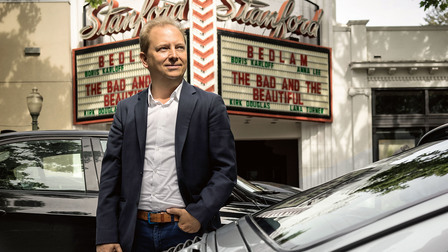Technology and Talent
Cross-pollination: Banks, start-ups, and innovators are located side by side in San Francisco’s Financial District.
Eight million people. Thousands of start-ups. Billions of dollars of venture capital. Silicon Valley is the Babel of the digital age, an incubator of geniuses, and a Mecca for visionaries. Right in its midst:
Epicenter: Palo Alto, 7:58 a.m.
The faces of most of the patrons at the coffee shops along University Avenue in Palo Alto reflect the pale white light of their laptops or smartphones. Lines of industrious women and men form at the counters. As they wait, they email, chat, and build their networks. Everyone is communicating, either in digital or conventionally analogue form. Snatches of conversation fill the air: new websites, design proposals, job offers, stock portfolios. In the midst of this hubbub stands Thilo Koslowski, CEO of
![[+]](https://staging.www.porsche.com/filestore/image/multimedia/none/christophorus-issue382-article09-content-01/normal/72d28bb0-5cd7-11e7-9717-0019999cd470/porsche-normal.jpg)
Power walking: Creativity is on the move at campuses of tech giants like
Power dining: Thilo Koslowski (right) and colleague Stephan Baral visit Samsung’s cafeteria.
Sand Hill Road, 10:35 a.m.
Koslowski, who has a degree in business administration, spent nearly twenty years working for Gartner Inc., a technology research and advisory company in California, most recently as Vice President and Practice Leader Automotive and Smart Mobility—a division that he founded in Silicon Valley in 1997. In the spring of 2016 he came to
At the moment just a handful of employees are engaged in setting up
![[+]](https://staging.www.porsche.com/filestore/image/multimedia/none/christophorus-issue382-article09-content-02/normal/72d28bb1-5cd7-11e7-9717-0019999cd470/porsche-normal.jpg)
Meeting with Thilo Koslowski (third from left): The Chain Inc. start-up develops secure ways of recording transactions.
Open for new ideas: Large, open offices are conducive to exchanging ideas. For example, here with Thorsten Hayer, a member of Koslowski’s team.
Chain Inc., 2:30 p.m.
If you want to develop the future of intelligent mobility, you have to look far beyond traditional business models. Blockchains, which were initially used in distributed ledgers for the virtual currency Bitcoin, are one example of how the automotive experience can be still further improved in the twenty-first century. At Chain Inc., digital bookkeeping systems composed of blockchain networks can record and trace each transaction—whether it involves the vehicle identification number, previous owners, maintenance history, or micro-payments for lifestyle services. Chain Inc. software offers the possibility of reliable and incorruptible digital records. Thus far the technology has been used mainly by banks and stock markets. But smart mobility is opening up many new opportunities, which Koslowski discusses at a meeting with Chain employees. In typical Silicon Valley fashion, the team sits in a large open-plan office while conference rooms hover above their heads like tree houses. “We’re like a band leader looking for good musicians to play the best songs,” says Koslowski in describing the strategy for approaching start-ups. “Technology should make people’s lives easier and let them have new experiences. In order to make this possible,
Behind the wheel, 3:02 p.m.
Silicon Valley doesn’t just mean working at computers. It also enjoys a beautiful location near the Pacific Ocean, wild coastal areas, and inland mountain ranges whose passes can be closed by snow well on into spring. “When you wake up here in the morning and see the blue sky, it’s inspiring. It’s no coincidence that California is known as the Golden State. You can leave your desk and all the meetings behind and, in no time at all, immerse yourself in nature, where you can literally clear your mind,” Koslowski rhapsodizes. “You can’t help but be affected by the fabulous surroundings. Whether I go for a walk on the beach or rev up one of my old 911s on a racetrack—that’s where I come up with my best ideas.”
Halo Neuroscience, 4:00 p.m.
Digitization gives premium providers like
![[+]](https://staging.www.porsche.com/filestore/image/multimedia/none/christophorus-issue382-article09-content-03/normal/7a1801fe-5cd7-11e7-9717-0019999cd470/porsche-normal.jpg)
Alma mater of innovation: Stanford University is one of the sources of Silicon Valley’s ideas.
Samsung, 6:27 p.m.
Since opening in the summer of 2015, Samsung’s new ten-floor Silicon Valley site in San Jose is currently home to around seven hundred employees and has space for up to two thousand. The Korean electronics producer deliberately chose to set up its research and development center near established Valley heavyweights like
By Steffan Heuer
Photos by Serge Hoeltschi
![[+]](https://staging.www.porsche.com/filestore/image/multimedia/none/christophorus-issue382-article09-margin-01/normal/7a1801ff-5cd7-11e7-9717-0019999cd470/porsche-normal.jpg)
![[+]](https://staging.www.porsche.com/filestore/image/multimedia/none/christophorus-issue382-article09-margin-02/normal/8139c39d-5cd7-11e7-9717-0019999cd470/porsche-normal.jpg)
![[+]](https://staging.www.porsche.com/filestore/image/multimedia/none/christophorus-issue382-article09-margin-03/normal/8139c39f-5cd7-11e7-9717-0019999cd470/porsche-normal.jpg)

















